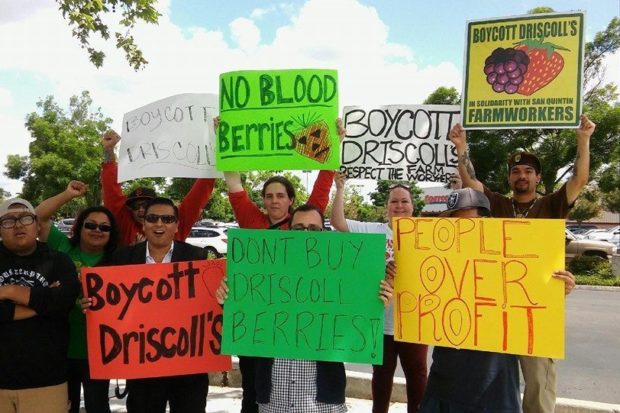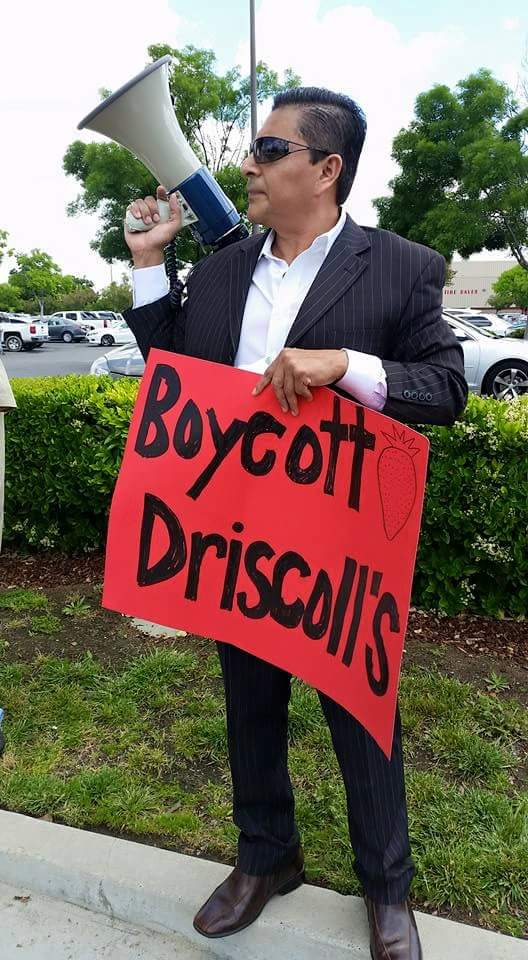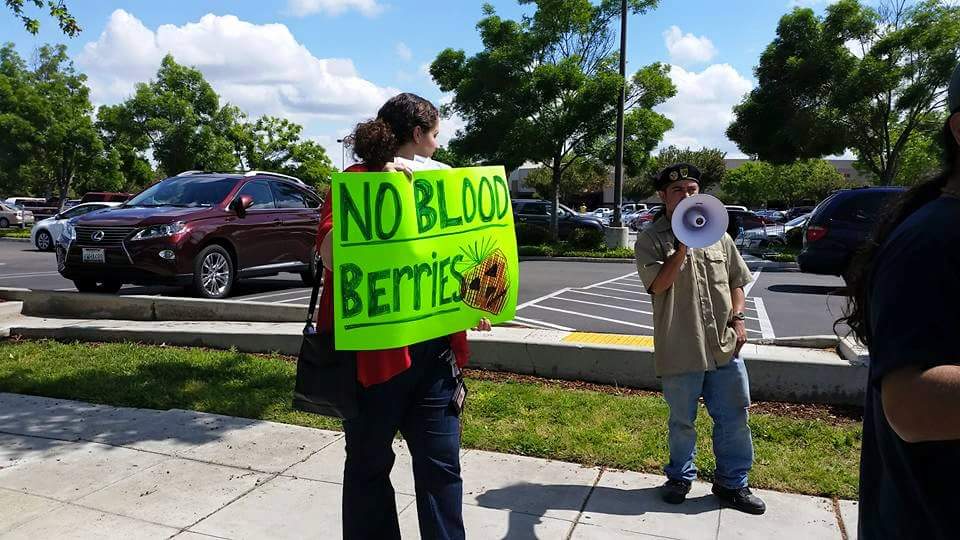
By Hannah Brandt
“Do you have brothers or sisters or someone close to you who is eight-years-old? I’m sure none of us would like a child this age to be lifting fruit for ten hours a day. In San Quintin and throughout Mexico and the U.S. children this young are working in the fields processing the food we buy in our grocery stores every week.” Gloria Gracida
On April 12, the final event in the Food Justice series was held at Fresno State. It was moderated by CSUF assistant professor of anthropology, Dvera Saxton. Those in attendance were primarily students in her class. Originally a group from Familias Unidas was set to present but canceled their tour stop in Fresno. So three guests were Skyped into the classroom and one local individual spoke about his experience as a farmworker throughout Mexico and the Pacific West. All the guests spoke in Spanish and Miguel Viegas translated. The first guest was Gloria Gracida, who is a spokesperson for day laborers in San Quintin, Mexico.
Gracida said, “Produce companies build wealth on the backs of these children and mothers, some eight or nine months pregnant, lifting heavy containers for twelve hours a day, breathing in pesticides, waking up at 3:00 AM, going to bed very late, and only making $6.00 a day. Fathers grow old still doing this work, too. The companies forget about them. There is no retirement or pension, no healthcare. Women face sexual harassment and assault; even pregnant teens are raped. With no childcare options that poor workers can afford, children as young as five work in the fields on both sides of the border.”
On March 17, 2015, 80,000 workers in San Quintin, Mexico went on strike against these conditions, as Gracida said, to no longer be invisible. The peaceful protest was directed against Driscoll’s Berries, which is headquartered in Watsonville, Cal. but has production on every continent but Antarctica, and is one of the largest producers of strawberries. The company and government responses to the protests were to attack workers who participated in the strike. Due to concerns about violence against workers, the movement turned its activism toward a boycott.
 Gracida spoke of other ways that students could help the workers besides protesting in the streets. She told them to ask the university to refrain from buying from Driscoll’s, to share their knowledge of the company’s practices on social media, to write to Driscoll’s demanding a change in policy, and to protest outside stores that sell Driscoll’s Berries such as Whole Foods, Costco, Trader Joe’s, and Safeway.
Gracida spoke of other ways that students could help the workers besides protesting in the streets. She told them to ask the university to refrain from buying from Driscoll’s, to share their knowledge of the company’s practices on social media, to write to Driscoll’s demanding a change in policy, and to protest outside stores that sell Driscoll’s Berries such as Whole Foods, Costco, Trader Joe’s, and Safeway.
Professor Saxton added that agribusiness companies have displaced farmers with their practices in Mexico. Driscoll’s partners with other growers like BerryMex and also contracts independent growers. Farm workers are employed by these companies and are picking for the Driscoll’s label. They bring in guest workers from Mexico to push out local farmworkers in the Pacific West. They promise workers lodging and food to migrate to the U.S. but force them to live in squalid conditions. They are not allowed to leave, they have a curfew and endure rampant abuse. Driscoll’s employs 40,000 people and there are 5 million farmworkers around the world facing these kinds of conditions.
One aspect of boycotting that is tricky is that Driscoll’s contracts with many producer groups, so their labeling is under different names in different places. For this reason, the Boycott Driscoll’s movement is considering launching a general strawberry strike, like the general grape strike led by Cesar Chavez in the 1960s. Since they cannot identify all the growers under the Driscoll’s umbrella who have the same abusive practices against workers, they will decide in June how to proceed on that issue.
There was international media coverage of the massive protests in 2015, but since then the press has been extremely quiet about the issue of farmworker’s rights. Familias Unidas has taken Driscoll’s to court in Washington state, but they have a harder time doing so in Mexico where workers have even fewer resources. Driscoll’s tries to justify its $6.00 a day wages because Mexico’s minimum wage is $4.00 a day. Workers are demanding a minimum wage of $20 a day, healthcare, overtime, 6 weeks paid maternity and paternity leave, and no tolerance for sexual assault.
Francisco Ventura is a grape farmworker in Madera who spoke about his experiences working throughout Mexico and the Pacific West since he was twelve. He migrated from Oaxaca, picking tomatoes and cucumbers in Sinaloa, Mexico. There are fewer rights for indigenous workers in Mexico who are less likely than non-indigenous Mexicans to have a formal education. In the sixth grade, Ventura was ridiculed for not knowing who to read or write.
Most of the poor have to leave school very young to work. Impoverished indigenous farmworkers have been displaced from their livelihoods in Oaxaca. Ventura’s father could only grow milpa (corn and squash) on his land and needed more income to survive. Often women have to work carrying their babies on their back. He remembered one incident where a mother took a child to work because she had nowhere else to take him and hid the baby in the bushes. A massive truck came along to spray pesticides and ran over the baby, killing him.
 Over decades, Ventura has picked beans, grapes, strawberries, raspberries, and blueberries. When he moved to Washington state in 1998 he started a strike demanding a five cent pay increase. The bosses refused, so they stopped working. If the workers didn’t process the amount employers demanded each day, they were fired. That meant they were also kicked out of the worker’s camp and have nowhere to live. It is very hard to find housing as such a migrant worker and some end up sleeping on the street.
Over decades, Ventura has picked beans, grapes, strawberries, raspberries, and blueberries. When he moved to Washington state in 1998 he started a strike demanding a five cent pay increase. The bosses refused, so they stopped working. If the workers didn’t process the amount employers demanded each day, they were fired. That meant they were also kicked out of the worker’s camp and have nowhere to live. It is very hard to find housing as such a migrant worker and some end up sleeping on the street.
If workers speak out against their conditions, he said, they are threatened with deportation. Sometimes corrupt bosses will change the weight of the berries picked so as to not pay workers what they really earned. In addition to the risk of wage theft, there are also dangers from the pesticides and other chemicals used in the fields, as well as the heavy equipment.
Ventura shared a personal account of those hazards. One boss he had was in need of a mechanic. Instead of hiring one, he demanded that Ventura, who was not trained as a mechanic, do that work on top of his other duties in the field. While working underneath a vehicle he was crushed, but could not speak out about it because he was threatened with dismissal and deportation.
There is hope. Eighteen-year-old university student, Octavio Angel Lopez, and twenty-six-year-old Lorenzo Ramirez are organizing workers in San Quintin, Mexico where so many Driscoll’s Berries workers live. Lopez is a university student and Ramirez is the secretary general of the farmworker’s union, SINDJA, National Democratic Independent Farmworkers Union (Sindicator Independendiente Nacional de Jornaleros Agricolas). Ramirez said that in Mexico there have never been unions led by workers advocating for workers. According to him, this union is the only way to put pressure on the companies to comply with the proposed contract for worker’s rights.
The international boycott of Driscoll’s has been supported by AFL-CIO and grassroots organizations from Stockton, Oakland, Sacramento, and Washington state. These organizations picketed outside Whole Foods, Costco, and Safeway, informing consumers about Driscoll’s practices and petitioning them to refrain from buying their berries.
The local boycott committee in Fresno has hosted fundraisers, educational events, and picket lines. Contact Dvera Saxton for more information or to contribute financially (disaxton@gmail.com) The t-shirts worn in the photos are available for $15 (or more) to support farmworkers in San Quintin and the local boycott committee’s efforts. All photos courtesy of Dvera Saxton.
****
Hannah Brandt is the editor of Community Alliance newspaper. You can follow her on Twitter and Instagram at @HannahBP2. Follow the paper on Facebook at Community Alliance Newspaper and on Twitter and Instagram @fresnoalliance.
